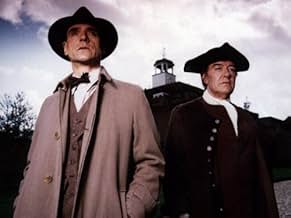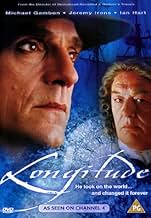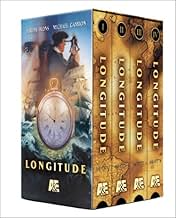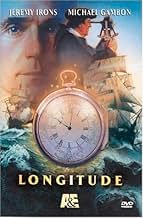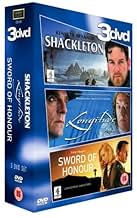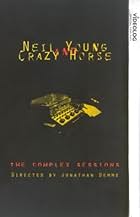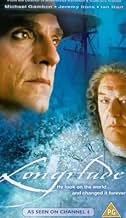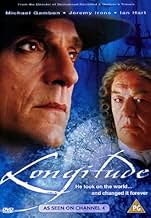Longitude
- Mini serie TV
- 2000
- 1h 39min
In due mondi paralleli, l'orologiaio John Harrison costruisce il cronometro da marina per una navigazione sicura in mare nel XVIII secolo e l'orologiaio Rupert Gould diventa ossessionato dal... Leggi tuttoIn due mondi paralleli, l'orologiaio John Harrison costruisce il cronometro da marina per una navigazione sicura in mare nel XVIII secolo e l'orologiaio Rupert Gould diventa ossessionato dal restaurarlo nel XX secolo.In due mondi paralleli, l'orologiaio John Harrison costruisce il cronometro da marina per una navigazione sicura in mare nel XVIII secolo e l'orologiaio Rupert Gould diventa ossessionato dal restaurarlo nel XX secolo.
- Ha vinto 5 BAFTA Award
- 7 vittorie e 5 candidature totali
Recensioni in evidenza
As a side note, Sir Isaac Newton (1642--1727) was in the same era as in the time setting of the story. I wonder if Sir Isaac Newton had ever involved with this 'board of longitude' ;)
The story flip flops back and forth between the life of a shell shocked (literally) 20th century academic and the tale of an 18th century clockmaker, John Harrison, obsessed with winning the Prize of Queen Anne for calculating longitude.
The surprising part is that the two loosely related plot lines work so well together, despite frequent and rapid cuts back and forth. This is a tribute to the great acting skills of the cast, including Jeremy Irons as the 20th century academic. At times, you have to wonder what the heck Iron's struggles with sanity have to do with the 18th century story, but it all seems to quietly tie together in the end.
Harrison knows that if he can develop an accurate watch, solving longitude was a breeze. This may seem academic, but the lives of British seamen were literally at stake. Developing an accurate timepiece was a far more difficult task than we can today imagine, and Harrison faced a skeptical board of theoreticians who preferred more complex scientific solutions than they thought could be provided by a humble clockmaker. The board utterly fails to grasp that the simple solution is the product of a profoundly complex and innovative device.
We think so highly of the great technological achievements of our times, and they are great. We need to be reminded from time to time, as this film does so well, that the breakthroughs of other generations were in there time quite profound. Moreover, we would not be where we are today without them. As the great Sir Issac Newton once said, "If I have seen further, it is because I have stood on the backs of giants".
Logitude is another in a long line of excellent British films that have not received the viewership they deserve. I watched this film on Channel 4 shortly after the new year. And I admit, all the hype over this film in the previous weeks was justified. Accute performances on Gambon's John Harrison as well as Iron's part, of whom mind I must admit I am no fan, plus the usual assortment of marvelous west end stage performers in particular John Wood as Edmund Halley proclaim Longitude as excellent entertainment.
The story was, on the other hand somewhat mellowed down and excessively lengthed. Yet I suppose in order to transpire the scientific details presented in the novel, length was required. But overall it is a great recount of history and I strongly recommend it to American audiences who won't find this sort of thing at home easily.
The performances of the two principals, Michael Gambon and Jeremy Irons were awe inspiring, the excellent supporting cast did not let them down.
What on the surface sounds like a dry story - the search for a means of accurately determining longitude at sea - and the obsession many years later of a returned WW1 soldier with locating and restoring the devices invented for that purpose - was turned into a genuine cliffhanger by the producers. Initially I found the switching from one story to another somewhat disconcerting, but it was done so well that it soon felt quite comfortable.
This is the story of one man's lifelong trial and error search to perfect his devices and to win the prize offered for the solution to the longitude problem. Against all odds and at great damage to his health he and his son eventually succeeded. Interspersed with this is the story of another man centuries later who was determined to locate & restore the devices and to ensure their preservation for future generations.
I can really recommend this show to anyone with an enquiring mind, who enjoys a fascinating story, excellently told.
Lo sapevi?
- QuizTo portray the aftermath of the shipwreck in the Isles of Scilly, dozens of extras had to lie in the cold surf, pretending to be dead, for over an hour.
- BlooperDuring the entire movie, when H1 is seen, the ticking that can be heard belongs to H3. The actual H1 and H2 tick in a rather dull way, but H3 is instantly recognizable, which is probably why its sound was used for H1 and H2 too. H4 appears to use the correct sound.
- Citazioni
Sir Edmund Halley: Don't touch that, boy!
William Harrison: I didn't, sir, honest, I was just looking.
Sir Edmund Halley: Do you know what that is?
William Harrison: To tell the movements of the stars.
Sir Edmund Halley: How do you know that?
William Harrison: It's my job at home.
Sir Edmund Halley: You have one of these at home!?
William Harrison: No, sir, we use Mr. Johnson next door's chimney.
Sir Edmund Halley: And, pray, what is it that you learn from Mr. Johnson next door's chimney?
William Harrison: The time.
Sir Edmund Halley: How can you tell the time with a chimney?
William Harrison: If you stand in the right place, you can see Sirius.
Sir Edmund Halley: Sirius?
William Harrison: It moves behind Mr. Johnso's chimney 3 minutes and 56 seconds earlier every day. We need the time for our timepiece, to tell if it's true.
Sir Edmund Halley: And is it?
William Harrison: It's bloody perfect, sir.
- ConnessioniReferenced in (500) giorni insieme (2009)
I più visti
Dettagli
- Tempo di esecuzione1 ora 39 minuti
- Colore
- Mix di suoni
- Proporzioni
- 1.78 : 1
Contribuisci a questa pagina


